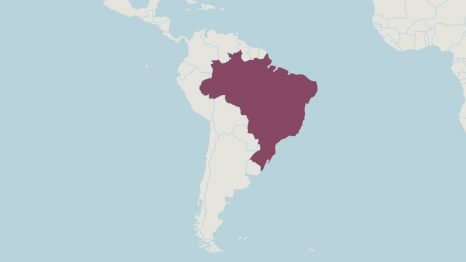“Education does not change the world. Education changes people. People change the world.” Paulo Freire, a Brazilian educator, has a clear idea of what good education needs to achieve. It needs to give young people the ability to think and act in terms of the future.
OverviewEducation in Brazil
The education landscape in Brazil is currently marked by social inequality, high non-promotion and drop-out rates, and teachers that are underpaid and underqualified. Brazil is ready to invest to counter these trends: In science-based vocational fields; in better equipment, especially in public schools; and in quality teacher education. Investments that enable good, just education. In addition to teaching the material, these investments are for lessons that teach life skills important for personal growth and social cohesion.

- Two-tier school system: Primary school (Ensino fundamental: grades 1—8), secondary school (Ensino médio: grades 9—11)
- Education budget: 5.9 % of GDP (2014)
- WEF Ranking Maths and Science: 131 of 137 (2017/18)
- PISA study: 63 of 71 (2015)
- Important topics: Improving teacher qualification, investments in better facilities at public schools
EngagementOur work in STEM
Inquiry-based learning is not yet part of everyday life in the classroom and therefore has a low priority in teacher qualification. With its international education program Experimento, Siemens Stiftung is working to bring solid STEM education to primary schools in Brazil.
International educational program Experimento
In 2015, Siemens Stiftung joined the Siemens Fundação Brasil foundation in adapting Experimento into a teacher training program at primary schools. The program was successfully implemented in collaboration with the Visconde de Porto Seguro foundation and the Universidade Metodista de São Paulo. The education faculty at Universidade Metodista de São Paulo integrated Experimento into its portfolio for teacher qualification and continuing education. In addition to the qualification and continuing education activities of our two partners, a broad network of active stakeholders who are successfully implementing Experimento quickly emerged. These include the Ayrton Senna foundation, which had been tasked by the Brazilian government to develop education programs and seeks to expand its portfolio with STEM subjects, and UNESCO, which has implemented Experimento in its 300 partner and primary schools.
Red STEM Latinoamérica
Since 2011, Siemens Stiftung has supported teachers and educators in eight Latin American countries with the foundation’s international education program Experimento, aiming to increase understanding in STEM subjects for children and young people and to awaken their interest in scientific and technological interrelationships. The Spanish website Red STEM Latinoamérica provides a comprehensive overview about the project and supports networking activities by individual stakeholders. Since 2020, you also find there a collection of about 500 open educational resources (OER) specifically designed for Latin American Schools.








